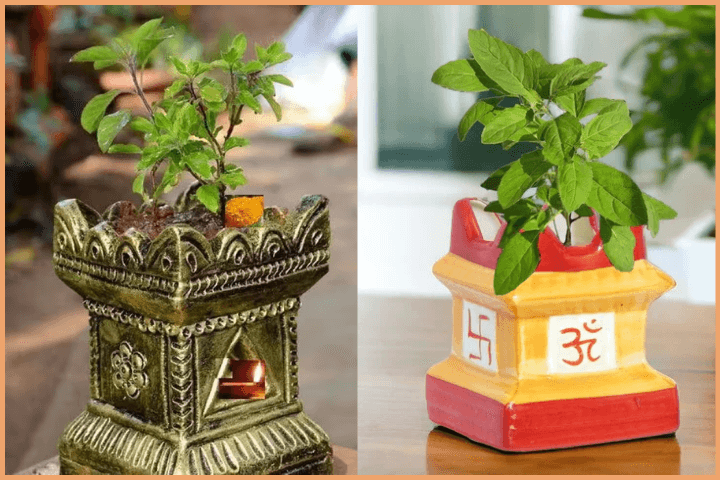Tulsi, or holy basil, is highly esteemed in Indian culture and Ayurvedic medicine. Renowned for its divine significance and potent healing properties, Tulsi transcends being just a plant, symbolizing purity, devotion, and wellness. From spiritual rituals to medicinal remedies, Tulsi plays a vital role in promoting health and harmony. Let’s explore the significance of Tulsi, its medicinal benefits, and its relevance in daily life.
Spiritual and Cultural Significance of Tulsi
Hindu tradition and mythology deeply embrace Tulsi. People regard Tulsi as the earthly form of Goddess Tulasi, who is believed to be an incarnation of Goddess Lakshmi, the consort of Lord Vishnu. Many households worship Tulsi, symbolizing protection, purity, and devotion.

A Symbol of Devotion and Prosperity
In Hindu households, Tulsi is often planted in the courtyard and worshipped daily with offerings of incense, lamps, and prayers. People believe that nurturing Tulsi invites positive energy, wards off negativity, and brings prosperity.
Tulsi Vivah – A Sacred Ceremony
Every year, during the Kartika month, Hindus celebrate Tulsi Vivah, symbolizing the ceremonial marriage of Tulsi to Lord Vishnu. This ritual marks the beginning of the Hindu wedding season and is believed to promote harmony and happiness.
Vastu Benefits
According to Vastu Shastra, planting Tulsi in the northeast, north, or east direction of the house attracts positive energy and enhances spiritual vibrations. It also helps eliminate Vastu dosha and promotes a serene environment.
Medicinal and Health Benefits of Tulsi
Beyond its spiritual significance, Tulsi is widely recognized for its therapeutic properties. Ayurveda calls it the “Queen of Herbs” due to its immense medicinal value.
Boosts Immunity
Tulsi is rich in antioxidants, vitamin C, and zinc, making it a natural immune booster. Tulsi’s antibacterial and antiviral properties shield the body from infections, colds, and flu.
Improves Respiratory Health
Tulsi is highly effective in treating respiratory issues. It contains compounds like camphene and eugenol, which help clear congestion, soothe coughs, and reduce asthma symptoms.
Regulates Blood Sugar Levels
Consuming Tulsi leaves regularly lowers blood sugar levels, benefiting individuals with type 2 diabetes. Its anti-diabetic properties improve insulin sensitivity and reduce glucose levels.
Promotes Heart Health
Tulsi’s eugenol content lowers cholesterol and blood pressure, reducing the risk of heart disease. It prevents plaque buildup in the arteries, promoting smooth blood flow.
Reduces Stress and Anxiety
Tulsi’s adaptogenic properties help the body manage stress. Consuming Tulsi tea calms the mind, reduces anxiety, and promotes mental clarity.
Aids in Digestion
Tulsi enhances digestion by stimulating the secretion of digestive enzymes. It helps alleviate bloating, indigestion, and acidity.
Detoxifies the Body
Tulsi has natural detoxifying properties that cleanse the liver and kidneys. It reduces uric acid levels and prevents the formation of kidney stones.
Types of Tulsi and Their Benefits
There are several varieties of Tulsi, each with distinct medicinal properties:
- Rama Tulsi (Green Leaf): People commonly use it to treat coughs, colds, and respiratory disorders due to its cooling and mild flavor.
- Krishna Tulsi (Purple Leaf): With a stronger taste and aroma, Krishna Tulsi is effective for treating throat infections, congestion, and skin diseases.
- Vana Tulsi (Wild Tulsi): This variety grows in the wild and is rich in antioxidants. It boosts the immune system and alleviates stress.
- Amrita Tulsi: Often used in Ayurvedic medicine, this variety is valued for its detoxifying properties and is effective in managing chronic diseases.
How to Use Tulsi in Daily Life
Incorporating Tulsi into your routine is simple and beneficial. Here’s how you can make the most of its healing properties:
- Tulsi Tea: Steep 5-7 Tulsi leaves in hot water for 5-10 minutes. Adding honey or lemon enhances the flavor and amplifies the health benefits.
- Tulsi Kadha: Boil Tulsi leaves with ginger, black pepper, and cloves. Strain and sip this herbal decoction to strengthen immunity and relieve congestion.
- Chewing Fresh Leaves: Consuming 2-3 Tulsi leaves on an empty stomach daily helps detoxify the body and promotes overall well-being.
- Tulsi Oil or Juice: Applying Tulsi oil or juice on insect bites or skin infections provides quick relief due to its anti-inflammatory properties.
Tulsi in Skincare and Personal Care
Tulsi is also known for its skin-enhancing properties:
- Fights Acne: Its antibacterial properties help reduce acne and blemishes.
- Soothing Skin Irritation: Tulsi juice relieves redness and inflammation.
- Rejuvenates Skin: Tulsi face masks promote healthy, glowing skin by reducing pigmentation and dark spots.
Precautions and Side Effects
While Tulsi offers numerous health benefits, certain individuals should avoid or limit its consumption:
- Pregnant or breastfeeding women: Tulsi may affect hormonal balance.
- People on blood-thinning medication: Tulsi’s anticoagulant properties can increase the risk of bleeding.
- Individuals preparing for surgery: Stop consuming Tulsi two weeks before surgery to prevent bleeding complications.
Embracing Tulsi’s Holistic Benefits
The significance of the Tulsi plant extends beyond its religious and cultural symbolism. It is a natural healer with immense medicinal value that supports overall well-being. By including Tulsi in your daily life, you can strengthen your immune system, enhance your mental clarity, and promote a healthier lifestyle. Whether in tea, kadha, or skincare, Tulsi remains a timeless remedy for promoting balance and harmony in life.

